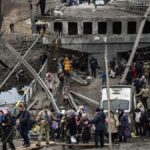
Over one million Ukrainian refugees have fled Russian rockets and tanks in recent days and many have chosen to stay in neighboring Poland, close to the homes they hope to return to one day and to the fathers and sons they had to leave behind.
But for those continuing their journey west, Germany is next. Just over a week into the war, Berlin has become a major hub for refugees from Ukraine, some traveling on, others eager to settle here. The numbers have surged in recent days. On Monday, the city administration reported finding beds for some 350 refugees. On Friday, more than 10,000 arrived in the German capital by train and bus, and city authorities are bracing for more.
Several buses carrying 120 Jewish children from Odessa, many of them orphaned, were among those arriving on Friday in Berlin, where they were welcomed by the Jewish organization Chabad Berlin and put up in a hotel. The youngest was only born in January.
“We have to be prepared that this is the biggest movement of people Europe faces since the end of World War II,” said Katja Kipping, minister of social affairs in Berlin’s regional administration. “We’ve only seen the tip of the iceberg.”
The mobilization of volunteers and donations has been swift and remarkable. Across Germany, volunteers have set up websites and special channels on social media to streamline the help in areas from transport to translation. The number of Berliners offering to help has been so great that volunteers are being turned away.
In the earlier crisis, Germany stood apart from most of its neighbors in opening its doors to refugees, a stance that was used by the far right to create a powerful backlash and political headache for the chancellor at the time, Angela Merkel. But in welcoming the wave of Ukrainians — fellow Europeans and mostly Christian, unlike the Syrians — Germany now has plenty of company, with Poland and Hungary, usually vehemently anti-immigrant, among those taking the lead.
German support is taking many unexpected forms. Berlin, famous for its clubbing scene, is using the reopening of night clubs this weekends after weeks of Covid-related closures as a fund-raiser under the motto “Club culture united — Stand up for Ukraine.”




